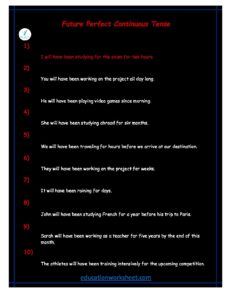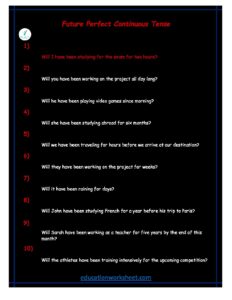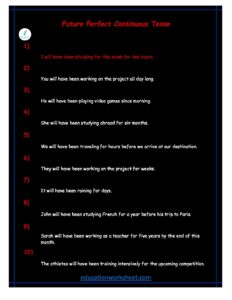how to converting Future Perfect Continuous Tense positive sentences to interrogative form
how to converting Future Perfect Continuous Tense positive sentences to interrogative form
The Future Perfect Continuous Tense is a complex yet important aspect of English grammar. It is used to express actions or events that will have been ongoing for a specific duration in the future. In this guide, we will explore how to convert positive sentences in the Future Perfect Continuous Tense into interrogative sentences. Interrogative sentences are used to ask questions, and they play a crucial role in effective communication. Understanding how to transform statements into questions in this tense is an essential skill for English learners.
I. Understanding the Future Perfect Continuous Tense

Before we dive into converting positive sentences to interrogative forms, it’s crucial to have a clear understanding of the Future Perfect Continuous Tense. This tense is used to describe actions that will have been in progress for a specified duration by a certain point in the future.
Structure: Subject + will have been + present participle (base verb + -ing) + time expression
For example:
- She will have been studying for three hours by 6 PM.
- They will have been working on the project for a month next week.
II. Converting Positive Sentences to Interrogative Sentences
To convert a positive sentence in the Future Perfect Continuous Tense into an interrogative sentence, you’ll need to follow some simple rules and guidelines:
- Swap the Subject and Auxiliary Verb
In positive sentences, the subject comes before the auxiliary verb “will have been.” In interrogative sentences, this order is reversed. Therefore, the first step in converting a sentence is to switch the positions of the subject and the auxiliary verb.
Positive Sentence: They will have been gardening for two hours. Interrogative Sentence: Will they have been gardening for two hours?
- Add the Question Word
If the sentence requires more specific information, you can add a question word (who, what, where, when, why, how, etc.) to the beginning of the interrogative sentence.
Positive Sentence: She will have been swimming. Interrogative Sentence: What will she have been doing?
- Include the Auxiliary Verb in Front of the Subject
Make sure to include the auxiliary verb “will” in front of the subject to form a question. This is important for ensuring your sentence is interrogative.
Positive Sentence: They will have been playing football. Interrogative Sentence: Will they have been playing football?
- Maintain the Original Time Expression
Keep the original time expression at the end of the sentence. It’s essential to know the duration or point in time in the future the action refers to.
Positive Sentence: He will have been reading the book for two hours by 4 PM. Interrogative Sentence: Will he have been reading the book for two hours by 4 PM?
- Use Rising Intonation
When asking questions in English, it’s essential to use rising intonation, which means your voice goes up at the end of the sentence. This signals to the listener that you’re asking a question.
Positive Sentence: They will have been traveling to Europe for a week. Interrogative Sentence (with rising intonation): Will they have been traveling to Europe for a week?
how to converting Future Perfect Continuous Tense positive sentences to interrogative form

III. Examples and Practice
Let’s go through some examples to illustrate the conversion of positive sentences in the Future Perfect Continuous Tense into interrogative sentences:
- Positive: She will have been singing for an hour. Interrogative: Will she have been singing for an hour?
- Positive: They will have been working on the project all night. Interrogative: Will they have been working on the project all night?
- Positive: He will have been playing the guitar at the concert for 20 minutes. Interrogative: How long will he have been playing the guitar at the concert?
- Positive: We will have been waiting for the bus for ages. Interrogative: Will we have been waiting for the bus for ages?
- Positive: It will have been snowing heavily for hours. Interrogative: Will it have been snowing heavily for hours?
IV. Common Question Words
In interrogative sentences, question words are often used to seek specific information. Here are some common question words that can be used in interrogative sentences:
- What – to inquire about actions or activities.
- Who – to ask about the person or people performing the action.
- Where – to question the location of the action.
- When – to find out the specific time or moment.
- Why – to understand the reason or purpose.
- How – to seek information about the manner or method of the action.
- How long – to ask about the duration of the action.
Let’s see how these question words can be applied to interrogative sentences in the Future Perfect Continuous Tense:
- What will they have been doing for an hour?
- Who will have been studying for the test?
- Where will they have been traveling for two weeks?
- When will she have been cooking dinner?
- Why will he have been working on the project for so long?
- How will they have been preparing for the competition?
- How long will you have been practicing the piano by 5 PM?
V. Negative Interrogative Sentences

Negative interrogative sentences are used to ask questions that include a negative element. To create a negative interrogative sentence in the Future Perfect Continuous Tense, follow these steps:
- Begin with the auxiliary verb “will” or “won’t” (contraction of “will not”).
- Place the subject after the auxiliary verb.
- Use the auxiliary verb “have” and “not” (or its contraction “haven’t”) before “been.”
- Add the present participle (base verb + -ing).
- Include the rest of the sentence structure as in positive interrogative sentences.
Example: Positive Sentence: They will have been studying for five hours. Negative Interrogative Sentence: Won’t they have been studying for five hours?
VI. Practice Exercises
To solidify your understanding of converting positive sentences to interrogative sentences in the Future Perfect Continuous Tense, try these practice exercises:
- Positive: She will have been cooking all afternoon. Interrogative: ____________?
- Positive: They will have been practicing for the concert for a month. Interrogative: ____________?
- Positive: He will have been hiking in the mountains for days. Interrogative: ____________?
- Positive: We will have been working on this project for a year. Interrogative: ____________?
- Positive: It will have been raining for hours. Interrogative: ____________?
- Negative: You won’t have been studying for the test. Negative Interrogative: ____________?
- Negative: She won’t have been reading for very long. Negative Interrogative: ____________?
- Negative: They won’t have been playing soccer all day. Negative Interrogative: ____________?

